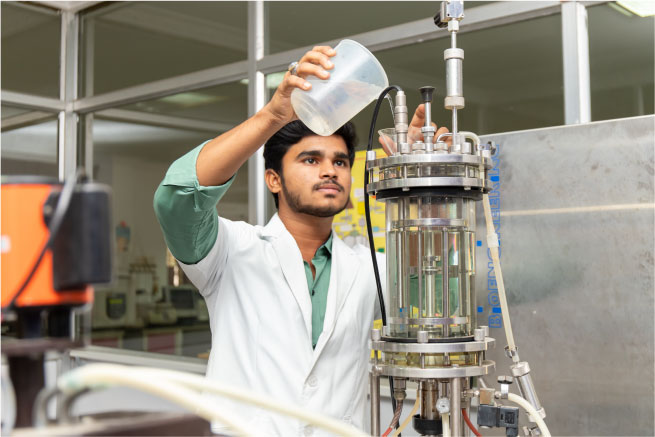
The Department of Biomedical Engineering offers a dynamic and interdisciplinary Ph.D. program that blends engineering principles with medical and biological
sciences to address critical challenges in healthcare. The program aims to advance knowledge in the field through cutting-edge research, innovation, and collaboration
with leading hospitals, research institutions, and industries. Our Ph.D. program provides a strong foundation in areas such as medical imaging, biosignal processing,
biomaterials, biomechanics, neural engineering, bioinstrumentation, and regenerative medicine. The department is equipped with state-of-the-art laboratories and research
centers that support high-impact research and enable scholars to explore translational solutions to real-world medical problems. Ph.D. scholars are guided by experienced
faculty members who are actively involved in national and international research collaborations, funded projects, and publications. The department encourages
interdisciplinary research, and scholars have the opportunity to work across domains including artificial intelligence in healthcare, wearable devices, point-of-care
diagnostics, and rehabilitation engineering. With a focus on innovation and sustainability in healthcare technologies, the program prepares scholars for careers in
academia, research organizations, healthcare industries, and startups. The department also offers training programs, workshops, and conferences to enhance research skills
and professional development.
The Department of Biomedical Engineering is dedicated to advancing healthcare technologies through interdisciplinary research and innovation. Our faculty and
research scholars work at the intersection of engineering, biology, and medicine, with expertise in the following core areas:
Advanced techniques in MRI, CT, Ultrasound, PET, and AI-based image analysis for diagnosis, surgical planning, and disease monitoring.
Analysis and interpretation of physiological signals such as ECG, EEG, EMG,and PPG for early disease detection and patient monitoring.
Development of biocompatible materials for implants, prosthetics, and scaffolds in regenerative medicine and drug delivery systems.
Study of human motion and mechanics to design assistive devices, prosthetics,and rehabilitation systems.
Design and development of diagnostic, therapeutic, and wearable devices to support clinical applications and personalized healthcare.
Innovations in interfacing technology to support neuroprosthetics, cognitive monitoring, and neural rehabilitation.
Application of deep learning, pattern recognition, and data analytics to medical diagnostics, predictive modeling, and decision support systems.
Integration of remote patient monitoring, mobile health, and Internet of Medical Things (IoMT) to enhance access and quality of care.
Utilization of optical imaging and sensing technologies for non-invasive diagnostics and therapeutic applications.
Development of microfluidic and nano-sensor technologies for real-time,point-of-care diagnostics.
These areas reflect the department’s commitment to solving complex biomedical challenges, improving patient care, and training the next generation of researchers and innovators in biomedical engineering.
| Name | Designation | Specilization |
|---|---|---|
| Dr.T.Arunprasath | Professor | Image processing |
| Dr. M. Pallikonda Rajasekaran | Professor | Biomedical Instrumentation, Image processing |
| Dr. M. Pallikonda Rajasekaran | Professor | Biomedical Instrumentation, Image processing |
| Dr. Seshadhri Srinivasan | Professor | Biosignal processing |
| Dr. S. Kalimuthukumar | Associate Professor | Embedded systems |
| Dr. S. Sakthivel | Associate Professor | Rehabilitation Engineering |
| Dr. R. Kottaimalai | Associate Professor | Biomedical Instrumentation, Signal/Image processing, Brain Computer Interface |